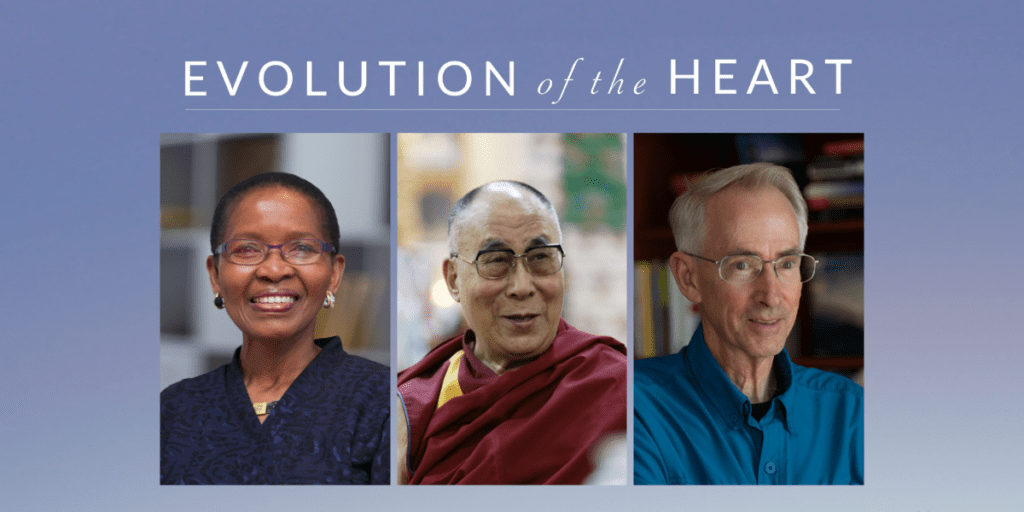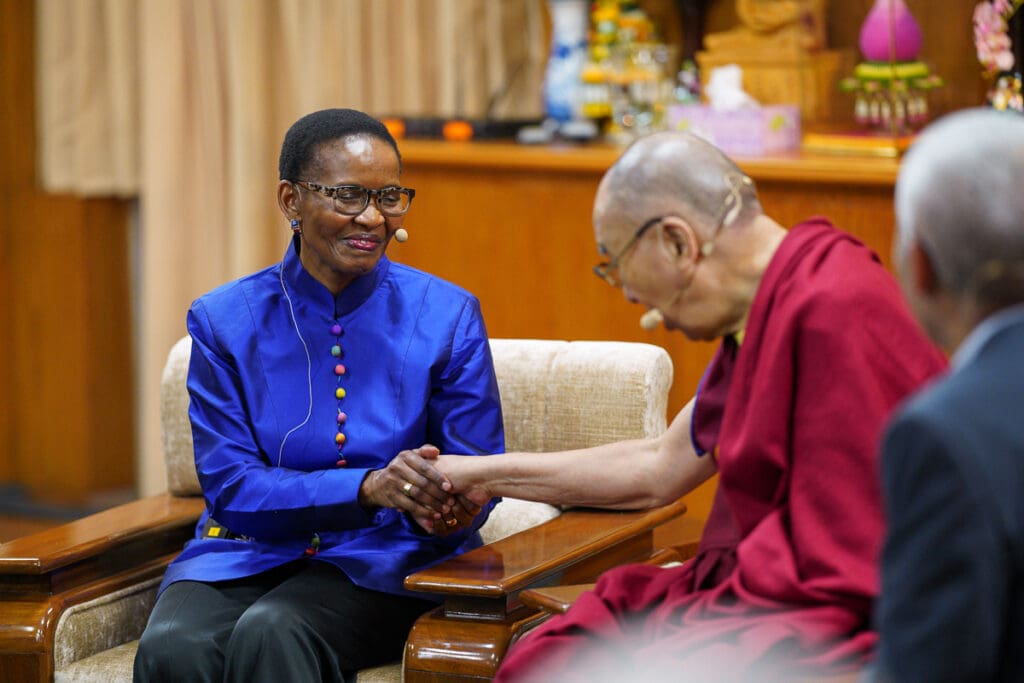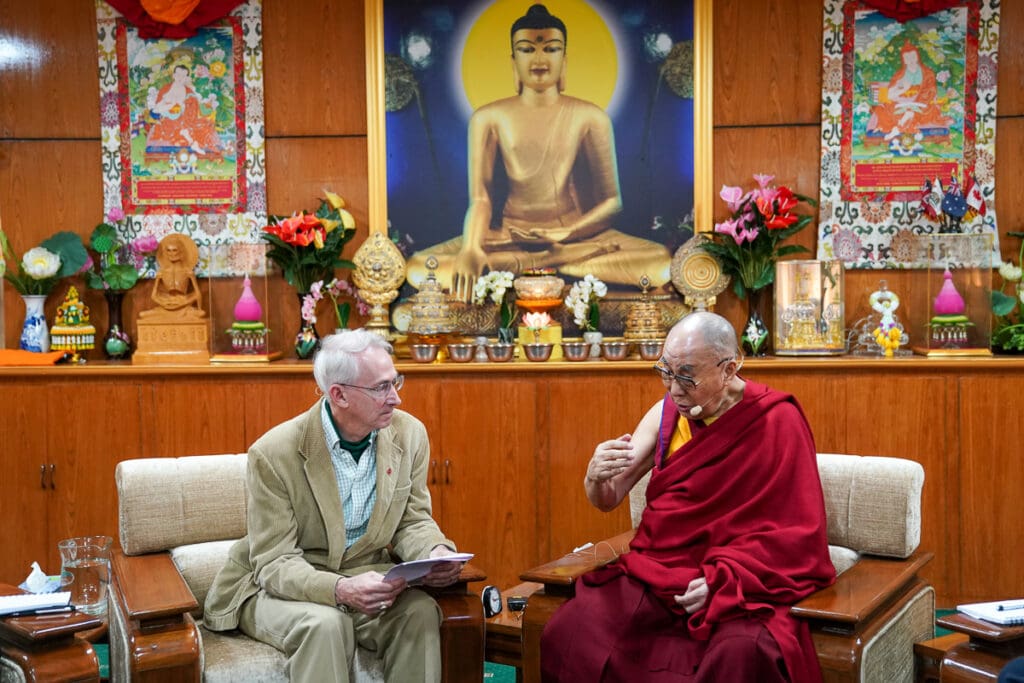
To celebrate the Dalai Lama’s birthday on July 6th, Mind & Life is pleased to announce the release of a new film, “Evolution of the Heart.” The film pays tribute to the Dalai Lama’s lifelong spirit of inquiry and values he has long championed: compassion, forgiveness, cooperation, altruism, and kindness.
The documentary chronicles profound conversations between the Dalai Lama and two prominent thought leaders: evolutionary biologist David Sloan Wilson and social scientist Pumla Gobodo-Madikizela.
“Evolution of the Heart” condenses more than three hours of conversation—and years of in-depth research—into a 36-minute film. This work builds on the tradition of Mind & Life Dialogues in bringing leading thinkers together with the Dalai Lama to discuss critical issues at the intersection of science and contemplative wisdom.
David and Pumla come from very different backgrounds and life experiences. David’s work focuses on the science of human evolution beyond the confines of genetics, while Pumla’s perspective is informed by her role as a member of South Africa’s Truth and Reconciliation Commision (TRC). She worked closely with Archbishop Desmond Tutu on the forgiveness and healing that was central to the TRC’s mission.
“Evolution of the Heart” draws out each presenter’s unique vantage points, which ultimately converge through insights and wisdom shared by the Dalai Lama. David notes the important role of prosocial behaviors in the evolution of the human species. While much is made about competition and “survival of the fittest”—especially in the Western world—human societies have largely evolved through our sense of cooperation with others. David shares that there’s been a “sea change” in the field of evolution with a focus on “compassion and altruism,” but there are challenges. As David notes, humans are the most cooperative mammals on earth; yet “all groups are susceptible to the wolves of selfishness.” He goes on to share that evolutionary processes favor “destructive selfishness and produce social pathologies” such as violence, greed, and oppression. As such, “the suffering that we inflict on one another is a product of evolution.” These processes are largely hidden from us, rooted in our survival instincts.
On the positive side, the natural processes of evolution have shaped our modern world in good ways with remarkable developments in language, art, technology, and science. Yet, they have also wrought the grave challenges we face at the individual level with inequity, loneliness, and depression and at the societal and planetary levels with systemic oppression and climate change, among many other issues. It cannot be overstated that these challenges are detrimental to individuals and represent a host of existential threats to the human race. It’s clear that what’s needed are more conscious efforts to understand and manage these evolutionary processes in order to create more equitable and compassionate communities and ultimately to transform societies. Toward that end, David calls for us to engage in the work of “conscious evolution,” embracing compassion and altruism toward “an ethics for the whole world,” a perspective strongly supported by the Dalai Lama.


After introducing David’s research, the film turns to Pumla’s work and the philosophy of ubuntu. At the heart of ubuntu is the very notion of our interconnectedness as expressed in the phrases, “I am because you are,” and “a person becomes a human being through others.” Pumla’s work and insights take on the very real problems that surface in David’s outline of our evolutionary history. The violence, oppression, and self-serving behaviors that have occurred in every society throughout history require forgiveness and healing. Pumla speaks passionately about the importance of understanding the role of the body in relating to our shared humanity for it is there that we connect to each other beyond the intellect and in a place of compassion where we sense the pain and joy of others.
These efforts require a larger and deeper understanding of what it means to be human. If we are to survive and evolve as a global society, our notions of “self and other” must also evolve. As Pumla notes, “when we witness the stories of others, the lives of others,… it is almost as if you are reconstituting the self in relation to the other.”
And here we find the connection between David and Pumla’s work. The philosophy of ubuntu, along with other prosocial perspectives, is a deeply embedded cultural form of conscious evolution. It acknowledges the complexity of our differences while lifting up the value of embracing our shared humanity. Conscious evolution can be understood on two levels. The first is the direct act of offering kindness and compassion to others through moral or ethical reasoning. On a deeper level, it is to acknowledge that we are witnessing and actively engaged in the transformation of ourselves and our societies as we connect with others who are different from us.
In “Evolution of the Heart” David, Pumla, and the Dalai Lama agree that it is through this sense of interconnection that we ultimately create an ethics for the whole world. And inside of this work, we evolve as a species, consciously. We may never completely erase the core problems we face. There may always be forms of oppression and injustice; yet, conscious evolution is available to us and opens up possibilities to reduce suffering and embrace our shared humanity.
As we celebrate the Dalai Lama’s birthday, we also honor his clear and simple message to educate ourselves, to embrace each other with compassion, to combine our intellect with warmhearteness, and to share this wonderful planet with each other. “Evolution of the Heart” supports these aspirations with scientific knowledge, contemplative wisdom, and lived experiences that can inform our daily efforts to find compassion and connection with others, and help us contribute to positive change within our local and global communities.

